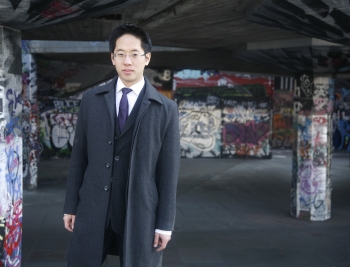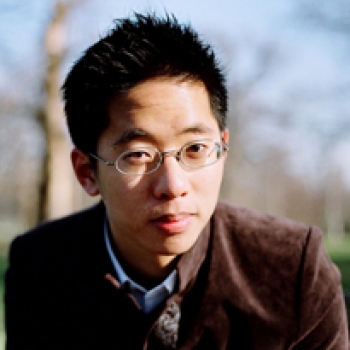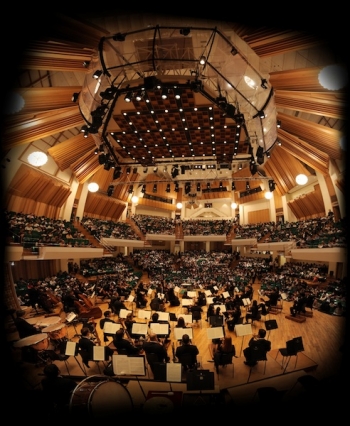This article was amended on 20 November, 2013 to reflect Fung Lam's new role as Composer-in-Residence at the Hong Kong Philharmonic Orchestra.
Many of us have faith that that spirituality can drive creativity. Regardless of your faith (or lack of faith), the aesthetic of religion provides all the inspiration you need to compose constellations and galaxies for listeners to immerse themselves in. This way of understanding music isn’t too off the mark for the young Fung Lam, currently Composer-in-Residence with the Hong Kong Philharmonic Orchestra. For him, music is all about the environment, the ambience, and doing justice to people who willingly lock themselves in a quiet hall to concentrate on listening to his work.
And justice he does: his most significant achievements thus far are his commissions with the BBC. His first work for symphonic orchestra, “Illumination”, was premièred by the BBC Philharmonic in 2005 and broadcast on BBC Radio 3. Another flagship composition, “Amit?bha”, is named after the Buddha of Infinite Light, creator of a realm of pure and unsurpassed bliss.
Many of us have faith that that spirituality can drive creativity. Regardless of your faith (or lack of faith), the aesthetic of religion provides all the inspiration you need to compose constellations and galaxies for listeners to immerse themselves in. This way of understanding music isn’t too off the mark for the young Fung Lam, currently Composer-in-Residence with the Hong Kong Philharmonic Orchestra. For him, music is all about the environment, the ambience, and doing justice to people who willingly lock themselves in a quiet hall to concentrate on listening to his work.
And justice he does: his most significant achievements thus far are his commissions with the BBC. His first work for symphonic orchestra, “Illumination”, was premièred by the BBC Philharmonic in 2005 and broadcast on BBC Radio 3. Another flagship composition, “Amit?bha”, is named after the Buddha of Infinite Light, creator of a realm of pure and unsurpassed bliss.
“Buddhism is very philosophical, a highly refined intellectual tradition,” suggests Fung. “Both the experience of music and the experiential side of religion possess mysterious, profound qualities,” he tells me. This music aficionado is a high-flying achiever by any standards. Born in 1979, he is probably the first and youngest composer from Hong Kong who has made deep inroads into the coveted market of the BBC and other British platforms of music. Just last year, he completed a doctoral degree in composition with the University of Sussex, studying with Martin Butler, Michael Finnissy and Michael Zev Gordon. Earlier, he earned a Masters degree in Composition at the University of Southampton in 2002.
Another work entitled “Unlocking” was premiered by the BBC and broadcast on BBC Radio 3’s ‘Discovering Music’ program and was given its Asian première last year by the Hong Kong Philharmonic Orchestra. Both Illumination and “Unlocking” have been performed by international orchestras, among them the New Zealand Symphony Orchestra and Hong Kong Sinfonietta.
This busy composer was invited along with other artists, such as the British pop group Pet Shop Boys, in a 2008 BBC commission at London’s South Bank Centre. In 2009, the London Symphony Orchestra premièred his composition titled: “Yong”, and it was followed by the Asian première at the Asian Music Festival 2010, performed by the Tokyo Philharmonic Orchestra and conducted by him. In September of the same year, the Hong Kong Philharmonic Orchestra performed “Rong” under the famed Edo de Waart, at Shanghai’s World Expo.
Despite his laurels, the composer takes his work seriously by going slow. For him, music requires generous concentration, and patience, precisely because music, much like the practice of Buddhism and mindfulness, is an activity locked in time. “As we practice spirituality moment-to-moment, we are simultaneously, uncontrollably, losing precious seconds of our lives,” he says. “To appreciate a composition fully, one must give attentiveness to every note, break, and movement that constitute the life of the performance. We can enjoy it only because it moves irrevocably towards its end. Both music and life are imprisoned in temporal mortality, and only mindfulness can help us come to terms with this often (sometimes deliberately) forgotten but basic reality.”
Though concentrating mainly on orchestral music, Fung betrays a burning hope to do even more, which includes not only original concert and multi-media works and collaborations, but also more technical activities like organizing orchestral events amd nurturing compositional and cultural talent (notably, he says pointedly, in Hong Kong). I couldn’t resist enjoying with him a hearty complaint about the difficulties the artistic professions face in Hong Kong. Like many who call Hong Kong home, we all share similar but diverse concerns about the West Kowloon Cultural District development plans. At several points I hinted that someone of Fung’s caliber was our beloved city’s best hope of recovering any sense of real artistic acumen from the arms of tackiness, general ignorance, and try-hard ostentation.
I doubt he needed me to tell him. His complaints originate from a musical world of notes and pitches, which is admittedly foreign to mine: my world is simply one of writing and words. But, music creates worlds, and worlds are always interconnected. The worlds of contemplation and poetic understatement intersect often in Fung’s compositions.
His third orchestral commission from the BBC, “Endless Forms”, will be premièred in July at the BBC Proms. As a marker of how far he has come, it shall be performed by the BBC Symphony Orchestra alongside Rachmaninov’s Piano Concerto No. 2 in C minor with Kirill Gerstein, and Prokofiev’s Symphony No. 6 in E flat minor. As such, Fung has reached several extraordinary milestones as Hong Kong’s first truly international composer. His liaison with the BBC, for example, is something artists from around the world would die for. But the way I see it, what else does one expect from someone who can merge the musical and spiritual worlds so proficiently? Surely he’s proud? He is in no doubt of his progress to be sure, but the bigger picture that he holds is far from complacent.
“We need to make peace with the fact that we all pass away, and our work is forgotten with time. Living well is the best we can do,” he says with a wistful smile.
If only we could make peace with impermanence with not only our mortal lives, but also the legacies we leave behind, we might be much more at peace with the vast, ineffable universe beyond us.
Listen to Fung Lam's music at his website.
I doubt he needed me to tell him. His complaints originate from a musical world of notes and pitches, which is admittedly foreign to mine: my world is simply one of writing and words. But, music creates worlds, and worlds are always interconnected. The worlds of contemplation and poetic understatement intersect often in Fung’s compositions.
His third orchestral commission from the BBC, “Endless Forms”, will be premièred in July at the BBC Proms. As a marker of how far he has come, it shall be performed by the BBC Symphony Orchestra alongside Rachmaninov’s Piano Concerto No. 2 in C minor with Kirill Gerstein, and Prokofiev’s Symphony No. 6 in E flat minor. As such, Fung has reached several extraordinary milestones as Hong Kong’s first truly international composer. His liaison with the BBC, for example, is something artists from around the world would die for. But the way I see it, what else does one expect from someone who can merge the musical and spiritual worlds so proficiently? Surely he’s proud? He is in no doubt of his progress to be sure, but the bigger picture that he holds is far from complacent.
“We need to make peace with the fact that we all pass away, and our work is forgotten with time. Living well is the best we can do,” he says with a wistful smile.
If only we could make peace with impermanence with not only our mortal lives, but also the legacies we leave behind, we might be much more at peace with the vast, ineffable universe beyond us.
Listen to Fung Lam's music at his website.

















